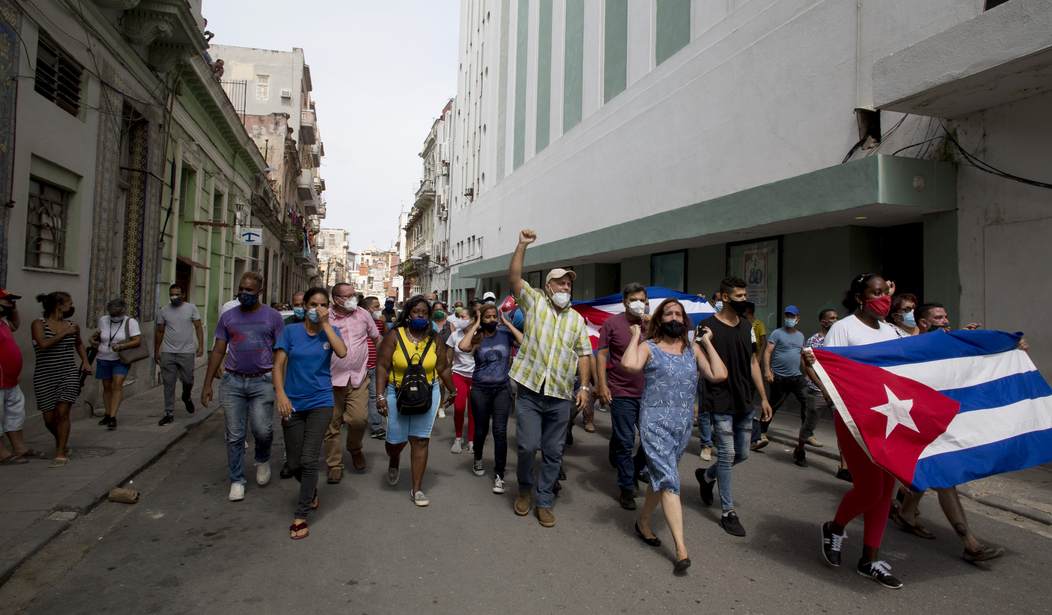The protests that erupted in Cuba yesterday had apparently been slowly building for months, but coordination on social media appeared to be the trigger for widespread marches in the streets of cities large and small across the country. The primary complaints involved the chronic shortage of food and other essential products and services, greatly exacerbated by the pandemic and sanctions on the government of Miguel Díaz-Canel. The protesters also demanded vaccines to combat the pandemic and an end to tyranny. This isn’t the first pro-democracy protest in Cuba’s history, but at least initially it looks to be one of the largest. (Miami Herald)
In an unprecedented display of anger and frustration, thousands of people took to the streets Sunday in cities and towns across Cuba, including Havana, to call for the end of the decades-old dictatorship and demand food and vaccines, as shortages of basic necessities have reached crisis proportions and COVID-19 cases have soared.
From the Malecón, Havana’s famous seawall near the old city, to small towns in Artemisa province and Palma Soriano, the second-largest city in Santiago de Cuba province, videos live-streamed on Facebook showed thousands of people walking and riding bikes and motorcycles along streets while chanting “Freedom!” “Down with Communism!” and “Patria y Vida” — Homeland and Life — which has become a battle cry among activists after a viral music video turned the revolutionary slogan “Homeland or Death” on its head.
“We are not afraid!” chanted Samantha Regalado while she recorded hundreds of people walking along a narrow street in Palma Soriano.
As usual, we were able to rely on the New York Times to offer an “interesting” spin on the protests in the streets of Cuba.
Shouting “Freedom” and other anti-government slogans, hundreds of Cubans took to the streets in cities around the country on Sunday to protest food and medicine shortages, in a remarkable eruption of discontent not seen in nearly 30 years. https://t.co/BbqQPLrNiE
— The New York Times (@nytimes) July 11, 2021
“Freedom and other anti-government slogans?” I suppose the folks in the newsroom at the Times just can’t help themselves.
Patrick Oppmann, who lives in Cuba and covers the news there for CNN, had a much more enlightened take on these developments and provides some video of the action in the streets where he lives.
I have lived in Cuba for nine years and the scenes we saw today were stunning. The protests spread more quickly than anyone could have imagined. I don’t know what tomorrow will bring but the level of discontent and anger isn’t going anywhere. pic.twitter.com/K8LZyuBY1R
— Patrick Oppmann CNN (@CNN_Oppmann) July 12, 2021
This could be seen as being reminiscent of the 1994 Maleconazo protests, but those were restricted almost entirely to the streets of Havana and only lasted for a few days. Widespread protests yesterday were reported in at least 25 cities and many smaller villages. At least initially, this looks like something significantly different from the protests under the Castro brothers.
The current dictator, Miguel Díaz-Canel, quickly delivered a televised address in response to the uprising. He was taking a page out of the Castros’ playbook, immediately blaming the United States for cutting off supplies. He also began spreading conspiracy theories suggesting that this was all an American plan to create an excuse for a military invasion of Cuba. (As if we really want to occupy his island.) He tried to rally the “revolutionaries” out into the streets in support of his regime.
Visibly upset and raising his voice, the Cuban leader warned that protesters would face a strong response and called “all revolutionaries” to confront them on the streets “with firmness and courage.”
“We are not going to hand over the sovereignty or the independence of the people,” he said. “There are many revolutionaries in this country who are willing to give our lives, we are willing to do anything, and we will be in the streets fighting.”
When Castro had to deal with the 1994 uprising, he briefly opened Cuba’s maritime borders and invited everyone who didn’t like it there to leave. Thousands of them did and the protests seemed to fizzle. I don’t think Díaz-Canel has the luxury of such an option if a serious portion of the country is rising against him. Also, the Cubans are experiencing a huge surge in COVID at the moment and their efforts to produce their own vaccine haven’t panned out yet. I doubt anyone is going to be rolling out the welcome mat for that many people who probably have high infection rates.
If this protest turns violent, it will only add to the overwhelming challenges facing the Cuban people. Food is scarce and so is medical help. Fighting in the streets against government militias and even some of their own neighbors would turn Cuba into even more of a disaster area than it currently is. I extend my hopes for their freedom, but also their survival.








Join the conversation as a VIP Member